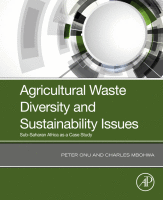Browse content
Table of contents
Actions for selected chapters
- Full text access
- Book chapterAbstract only
Chapter 1 - Waste management and the prospect of biodegradable wastes from agricultural processes
Pages 1-20 - Book chapterAbstract only
Chapter 2 - Agricultural wastes and opportunities in the food production chain
Pages 21-35 - Book chapterAbstract only
Chapter 3 - Methodological approaches in agrowaste preparation and processes
Pages 37-54 - Book chapterAbstract only
Chapter 4 - Sustainable agricultural waste diversity: advances in green energy and materials production
Pages 55-73 - Book chapterAbstract only
Chapter 5 - Sustainable agrowaste diversity versus sustainable development goals
Pages 75-96 - Book chapterAbstract only
Chapter 6 - New approach and prospects of agrowaste resources conversion for energy systems performance and development
Pages 97-118 - Book chapterAbstract only
Chapter 7 - Overview of models for agricultural waste management, and trends in biofuels production
Pages 119-136 - Book chapterAbstract only
Chapter 8 - Nascent technologies in resources conservation and sustainable agricultural development
Pages 137-154 - Book chapterAbstract only
Chapter 9 - Which way forward: agricultural waste management and the fourth industrial revolution appraisal
Pages 155-170 - Book chapterAbstract only
Chapter 10 - Economics and risk assessment of new technologies in agrowaste diversity
Pages 171-181 - Book chapterNo access
Index
Pages 183-187
About the book
Description
Agricultural Waste Diversity and Sustainability Issues: Sub Saharan Africa as Case Study presents solutions for overcoming limitations, guiding developmental processes, and improving knowledge transfer in agricultural waste management and development. The book gives considerable attention to treatment and conversion, with best management practices involving the reduction and elimination of waste volume in its various forms, sectors and streams. Sections cover waste management in the agriculture and food sector, including methodological approaches in waste preparation and processes, the most important energy generation techniques and strategies, and best practices, management, sustainability, associated technologies, accountability, communications, and involvement surrounding diverse stakeholders.
Agricultural Waste Diversity and Sustainability Issues: Sub Saharan Africa as Case Study illustrates the use of mathematical models to minimize operational cost in agro-waste management processes and discusses the application of eco-efficiency. Ultimately, the book focuses on the prospect of agro-wastes management and risk associated in the sub-Saharan African region, including Nigeria, Uganda, and South Africa as case studies.
Agricultural Waste Diversity and Sustainability Issues: Sub Saharan Africa as Case Study presents solutions for overcoming limitations, guiding developmental processes, and improving knowledge transfer in agricultural waste management and development. The book gives considerable attention to treatment and conversion, with best management practices involving the reduction and elimination of waste volume in its various forms, sectors and streams. Sections cover waste management in the agriculture and food sector, including methodological approaches in waste preparation and processes, the most important energy generation techniques and strategies, and best practices, management, sustainability, associated technologies, accountability, communications, and involvement surrounding diverse stakeholders.
Agricultural Waste Diversity and Sustainability Issues: Sub Saharan Africa as Case Study illustrates the use of mathematical models to minimize operational cost in agro-waste management processes and discusses the application of eco-efficiency. Ultimately, the book focuses on the prospect of agro-wastes management and risk associated in the sub-Saharan African region, including Nigeria, Uganda, and South Africa as case studies.
Key Features
- Captures a solutions-based assessment that redresses the challenges created by a poor biodiversity strategy in Sub-Saharan Africa to meet present needs in SSA and around the world
- Provides foundational information for agricultural diversity, food waste elimination, clean energy production, and technology emergence
- Enables a greater understanding of the state-of-the-art approach for effective biodegradable waste management
- Inspires further research into sustainable and cost-effective biowaste operations, wastes management models, methodologies for utilization and nascent technologies that are capable of bolstering clean energy generation
- Captures a solutions-based assessment that redresses the challenges created by a poor biodiversity strategy in Sub-Saharan Africa to meet present needs in SSA and around the world
- Provides foundational information for agricultural diversity, food waste elimination, clean energy production, and technology emergence
- Enables a greater understanding of the state-of-the-art approach for effective biodegradable waste management
- Inspires further research into sustainable and cost-effective biowaste operations, wastes management models, methodologies for utilization and nascent technologies that are capable of bolstering clean energy generation
Details
ISBN
978-0-323-85402-3
Language
English
Published
2021
Copyright
Copyright © 2021 Elsevier Inc. All rights reserved.
Imprint
Academic Press
